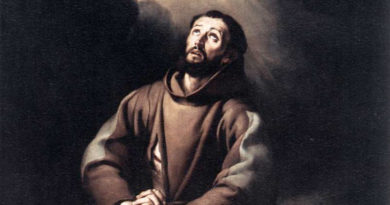He Descended into Hell
By Donald Harvey
HOLY WEEK always seems to be one of those occasions when our emotions run the full spectrum. From the euphoria of Palm Sunday to the Institution of the Last Supper to the agony in the garden, the betrayal and arrest – all these enable us to enter into a contemplation of those events in the life of Jesus and, if we allow ourselves, to become part of them. I always tried to lead congregations to actually enter into the occasion and imagine what it would be like if we actually were there.
Then there is Good Friday. Traditionally, many of us would join in the three-hour Watch by the Cross, and apply each of the “seven words” to our own lives, our own families, and indeed, our own parishes.
Then, at 3 pm we hear the words “It is finished” as He bows his head and dies. The body is taken down from the cross and ultimately placed in the tomb of Joseph and we leave the scene. We have accompanied Him through all of these events, and now Holy Week is over for another year.
Even when we identify these sad events with our own involvement and recognize the high cost paid for our redemption, the remorse and sorrow are tempered somewhat because throughout it all, we know the end of the story and that we will discover that the tomb is empty when we gaze in on Easter morning.
As a parish priest, often emotionally, spiritually, and physically exhausted by leading myself and others through these excruciating events, I found Saturday came as a welcome relief. I was able to move aside and let the ever-efficient Altar Guild come in and get the sanctuary back to order again. On Saturday they would remove the coverings that hid the crosses and restore the ornaments that had been removed from their usual places during the sombre “stripping of the Altar” on Maundy Thursday. And above all, they would begin arranging the flowers that had been absent since Ash Wednesday, in spectacular new arrangements around the sanctuary, chancel and nave. In a few hours we would be proclaiming with great gusto, The Lord is Risen and the sombre disciplines of Lent and Holy Week could be put aside for another year.
Holy Saturday had in fact become the transition day.
Few of us gave any thought to the intriguing question, “Where was Jesus from 3 pm on Good Friday until midnight on Saturday?
Could it not be that in following the pattern I have described above, we are leaving out a very important event in the whole salvation process?
Yet whenever we recite the creed of our baptism, the Apostle’s Creed, after proclaiming that He was “crucified, dead and buried” and before proclaiming “on the third day he rose again from the dead” we boldly state, “He descended into hell.”
Christian tradition has maintained that immediately after his death, Jesus went to the realm of the dead (place of departed spirits, as the BCP footnote phrased it) and there brought salvation to all the righteous who had gone before Him. Christian iconography usually depicts Him leading Adam and Eve into the new life and behind them follow a long line of patriarchs and prophets. Not only is it part of the Easter triumph, but He overcomes Satan and those he had been holding in his grasp – or as the beautiful Advent hymn phrases it :
He comes the prisoners to release
In Satan’s bondage held,
The gates of hell before him burst
The iron fetters yield.
For those who keep the Easter Triduum (treating Maundy Thursday, Good Friday and Holy Saturday as a three-fold connected unit) this certainly is emphasized in the Saturday liturgy and in many ways brings about the fullness of what Christ accomplished. To those of us who still follow the old Anglican tradition of simply using Saturday as an observance of “Resting from his work today / in the grave the Saviour lay) I strongly recommend that we take time on Holy Saturday to give thanks for the completion of the redemptive process and only then proclaiming our Easter joy.
While scriptural references admittedly are scarce on “The Harrowing of Hell”* they nonetheless are there in such powerful passages as 1 Peter 3:19 & 20 and Ephesians 4:9 &10. Indeed, the great protestant reformer John Calvin stated that the descent of Jesus into hell “ was necessary for Christians to realize how much our salvation cost the Son of God”.
Whether you read this “sermon” in the latter days of Lent or the opening days of Easter, it is my prayer that we will be reminded, not just of the “cost of our salvation” as Calvin puts it, but also of the fullness of that Victory over death and hell, and the promise of The New Life it gives each one of us. In the words of the Exultet, sung as the Pascal Candle is lit from the New Fire, we claim:
This is the Passover of the true Lamb of God,
By whose blood the homes of all the faithful
are hallowed and protected.
This is the night when of old you saved our fathers,
Delivering the people of Israel from their slavery,
And led them dry-shod through the sea.
This is the night when Jesus Christ
Vanquished hell
And rose triumphant from the grave …
Night truly blessed,
When heaven is wedded to earth
And all creation reconciled to God.
May we be filled with that joy on Easter morning, and like the Apostles at Emmaus greet our Risen Lord as He appears to us in the “breaking of the bread.” TAP
The Rt. Rev. Donald Harvey is Episcopal Visitor for the Anglican Network in Canada and resides in St John’s, Newfoundland.



